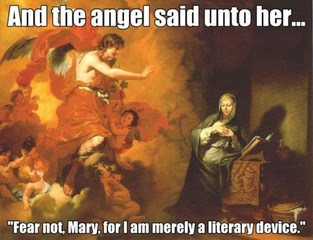Here we have another massive misunderstanding as to the patristic and Catholic meaning of a striking phrase: similar to the false perception of “Mother of God”.
Having a child conceived by the Holy Spirit has no direct analogy, because it was a one-time extraordinary event, in order to bring about the incarnation. We should fully expect to have some difficulty understanding it.
St. Augustine (354-430) stated that “Mary was that only one who merited to be called the Mother and Spouse of God.” (Sermon 208). Scripture speaks in terms of the bride being the Church, and makes analogies between marriage and Christ and His Church. So why should there be controversy about Mary being the spouse of the Holy Spirit?
By the same general reasoning that applies to Theotokos (arguing solely from the Bible, not Catholic tradition), it seems to me that “spouse of God” would also be appropriate and non-objectionable. That Jesus’ conception was of the Holy Spirit as a sort of “Father” is plain in the Bible: Matthew 1:18-20
If we ask, then, “Who is Jesus’ father?” (in terms of the origin of His conception), it’s not Joseph, but the Holy Spirit in one sense, and God the Father in another. Multiple senses and meanings and applications are common in Holy Scripture.
By analogy, then, if Jesus’ parents were Mary and the Holy Spirit, then by simple analogy it follows that Mary (in this particular sense, and this alone) is the “spouse of God” just as she was the Mother of God.
Likewise, “spouse of God” is thought to imply an equality with God, when in fact it’s only a limited analogical description based on Mary’s relation to the Holy Spirit in the matter of the conception of Jesus. This description is no more “unbiblical” or non-harmonious with scriptural thought than St. Paul saying “we are God’s fellow workers” (1 Cor 3:9; cf. 2 Cor 6:1), or St. Peter referring to men becoming “partakers of the divine nature” (2 Pet 1:4; cf. 1 Jn 3:2). These are similarly understood as not entailing equality with God.
Along these lines, there are many biblical passages about Israel or the Church being the “bride” of God the Father or Jesus Christ, God the Son:
Isaiah 54:5
Isaiah 62:5
Jeremiah 31:32 (cf. Jer 3:20)
Hosea 2:16, 19-20 (cf. Hos 4:12; 9:1)
Matthew 9:15 (cf. Mk 2:19-20; Lk 5:34-35; Mt 25:1-10)
2 Corinthians 11:2
Ephesians 5:28-29, 32 (cf. Rev 19:7; 21:2; 21:9)
Given all of this biblical data, saying that Mary is the “spouse of God” should not present any difficulty at all to anyone who accepts the Bible as God’s inspired revelation. The only possible objection would come from not understanding what is meant by the phrase in the first place.

Having a child conceived by the Holy Spirit has no direct analogy, because it was a one-time extraordinary event, in order to bring about the incarnation. We should fully expect to have some difficulty understanding it.
Christianity is filled with such anomalies, wonders, and paradoxes. How could Jesus be fully God and fully man? Run-of-the-mill logic cannot accept this, anymore than it can grasp the Trinity (hence many heretics deny both). It requires the eyes of faith and a comprehension of the “both/and” biblical, Hebraic outlook.
St. Augustine (354-430) stated that “Mary was that only one who merited to be called the Mother and Spouse of God.” (Sermon 208). Scripture speaks in terms of the bride being the Church, and makes analogies between marriage and Christ and His Church. So why should there be controversy about Mary being the spouse of the Holy Spirit?
By the same general reasoning that applies to Theotokos (arguing solely from the Bible, not Catholic tradition), it seems to me that “spouse of God” would also be appropriate and non-objectionable. That Jesus’ conception was of the Holy Spirit as a sort of “Father” is plain in the Bible: Matthew 1:18-20
If we ask, then, “Who is Jesus’ father?” (in terms of the origin of His conception), it’s not Joseph, but the Holy Spirit in one sense, and God the Father in another. Multiple senses and meanings and applications are common in Holy Scripture.
By analogy, then, if Jesus’ parents were Mary and the Holy Spirit, then by simple analogy it follows that Mary (in this particular sense, and this alone) is the “spouse of God” just as she was the Mother of God.
Likewise, “spouse of God” is thought to imply an equality with God, when in fact it’s only a limited analogical description based on Mary’s relation to the Holy Spirit in the matter of the conception of Jesus. This description is no more “unbiblical” or non-harmonious with scriptural thought than St. Paul saying “we are God’s fellow workers” (1 Cor 3:9; cf. 2 Cor 6:1), or St. Peter referring to men becoming “partakers of the divine nature” (2 Pet 1:4; cf. 1 Jn 3:2). These are similarly understood as not entailing equality with God.
Along these lines, there are many biblical passages about Israel or the Church being the “bride” of God the Father or Jesus Christ, God the Son:
Isaiah 54:5
Isaiah 62:5
Jeremiah 31:32 (cf. Jer 3:20)
Hosea 2:16, 19-20 (cf. Hos 4:12; 9:1)
Matthew 9:15 (cf. Mk 2:19-20; Lk 5:34-35; Mt 25:1-10)
2 Corinthians 11:2
Ephesians 5:28-29, 32 (cf. Rev 19:7; 21:2; 21:9)
Given all of this biblical data, saying that Mary is the “spouse of God” should not present any difficulty at all to anyone who accepts the Bible as God’s inspired revelation. The only possible objection would come from not understanding what is meant by the phrase in the first place.


